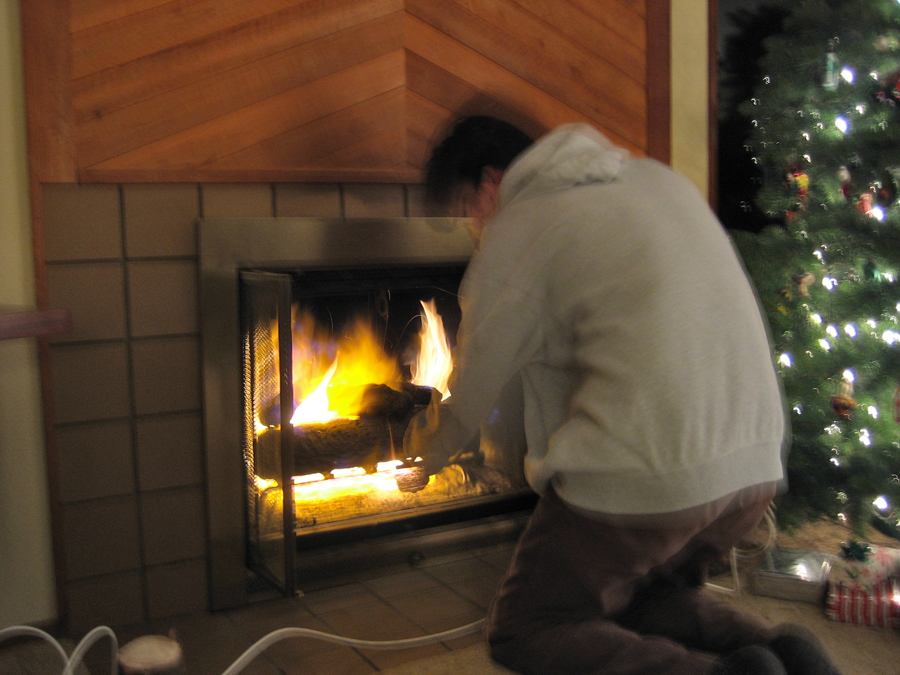Can You Burn Wood In A Gas Fireplace?
 Say you’ve got this very nice gas fireplace. It looks great in your living room and produces some gentle warmth. But you want more. More flames, more heat, more scent, more spectacle.
Say you’ve got this very nice gas fireplace. It looks great in your living room and produces some gentle warmth. But you want more. More flames, more heat, more scent, more spectacle.
Or maybe you’d like to save money on gas and you have some old wood lying around you want to get rid of. So you’re asking, “Can you burn wood in a gas fireplace?”
Let’s find out.
SPOILER ALERT: “Can You Burn Wood in a Gas Fireplace?” Answered
Usually I like to answer homeowner questions at the end of an article – to provide some background and build up suspense before the final reveal – but I’m changing my usual formula here out of a sense of urgency. The answer to “Can you burn wood in a gas fireplace?” is a resounding NO!
That is, if your setup is a true gas-only fireplace. In this type of installation, burning wood is extremely hazardous. With other kinds of gas fireplaces, you might be able to burn wood, but only under the right conditions.
What Type of Gas Fireplace Do You Have?
Find out which type of gas fireplace you own, as the first step toward safe operation. Don’t blindly take advice from your best buddy (or an anonymous online poster) who says, “Oh, my parents used to throw wood in our gas fireplace all the time.” Mom and Pop may’ve had a different kind of fireplace than yours … or happened to be extremely lucky.
- Built-in gas-only fireplace
This type is installed during new construction or renovation where there was previously no fireplace at all. Available in zero-clearance and freestanding styles, it’s designed to burn natural gas or propane, which is piped in and lit with an electric ignition (or a match in older models).
Can you burn wood in it?
No. As the name suggests, it’s for burning gas only. Repeat: burning gas ONLY. A built-in gas fireplace’s venting system is inadequate to deal with the smoke and vapors of a wood fire. And unvented gas fireplaces do not vent outside at all. What’s more, building code for gas fireplaces often specifies smaller clearances to flammable structural components like wall studs.
- Gas fireplace insert
An insert is a metal housing containing a gas burner and logset, retrofitted to transform a previously wood-burning fireplace into a gas one. Venting is via the existing chimney. There are several motivations for gas fireplace insert installation: energy-efficiency, cleanliness, and/or compliance with local law forbidding operation of a wood fireplace.
Can you burn wood in it?
Maybe. Find an HVAC pro to give you an expert opinion – and to make any necessary adjustments, like capping the gas line. Of course, you’ll need to ensure the flue is cleaned regularly.
- Logset
In this case, an artificial logset of heat-resistant ceramic or refractory cement is placed inside an existing wood fireplace. The “logs” produce a gas-powered flame, more for aesthetics than for actual heating. Once again, it’s vented through the old chimney.
Can you burn wood in it?
Probably. Often you’ll just need to move out the faux logset and you’re ready to burn wood. For safety’s sake, though, ask a pro to inspect the fireplace and flue first.
Hazards of Burning Wood in the Wrong Gas Fireplace
The dangers of burning wood in the wrong gas fireplace sound like something out of an apocalyptic horror movie. Try these on for size:
- Smoke and poison gas. When your fireplace venting system can’t handle burning wood, guess where the smoke ends up? Inside your living room, wreaking havoc with indoor air quality. Especially hazardous: carbon monoxide, a byproduct of burning fuel which is colorless, odorless -- and deadly.
- Destruction. Because wood burns much hotter than natural gas or propane, it can easily destroy the internal workings of your gas fireplace.
- House fire. The powerful heat may radiate into the walls surrounding your fireplace and spark a serious house fire.
- Explosion. That same heat might even transfer along the gas feeder pipe, leading to an explosion.
Laura Firszt writes for networx.com.
Looking for a Pro? Call us (866) 441-6648

Average Costs
Related Experiences

Emergency Gas Valve Repair Restored Our Heat When Winter Hit Hard

Water Heater And Air Handler Replacement For Our Condo Downsize



